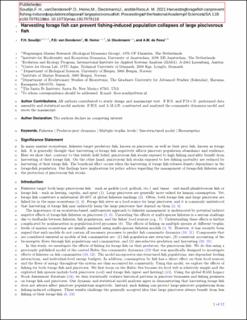| dc.description.abstract | Fisheries have reduced the abundances of large piscivores—such as gadids (cod, pollock, etc.) and tunas—in ecosystems around the world. Fisheries also target smaller species—such as herring, capelin, and sprat—that are important parts of the piscivores’ diets. It has been suggested that harvesting of these so-called forage fish will harm piscivores. Multispecies models used for fisheries assessments typically ignore important facets of fish community dynamics, such as individual-level bioenergetics and/or size structure. We test the effects of fishing for both forage fish and piscivores using a dynamic, multitrophic, size-structured, bioenergetics model of the Baltic Sea. In addition, we analyze historical patterns in piscivore-biomass declines and fishing mortalities of piscivores and forage fish using global fish-stock assessment data. Our community-dynamics model shows that piscivores benefit from harvesting of their forage fish when piscivore fishing mortality is high. With substantial harvesting of forage fish, the piscivores can withstand higher fishing mortality. On the other hand, when piscivore fishing mortality is low, piscivore biomass decreases with more fishing of the forage fish. In accordance with these predictions, our statistical analysis of global fisheries data shows a positive interaction between the fishing mortalities of forage-fish stocks and piscivore stocks on the strength of piscivore-biomass declines. While overfishing of forage fish must be prevented, our study shows that reducing fishing pressures on forage fish may have unwanted negative side effects on piscivores. In some cases, decreasing forage-fish exploitation could cause declines, or even collapses, of piscivore stocks. | en_US |
